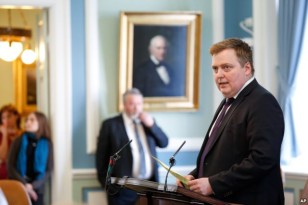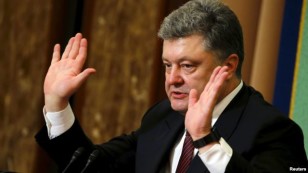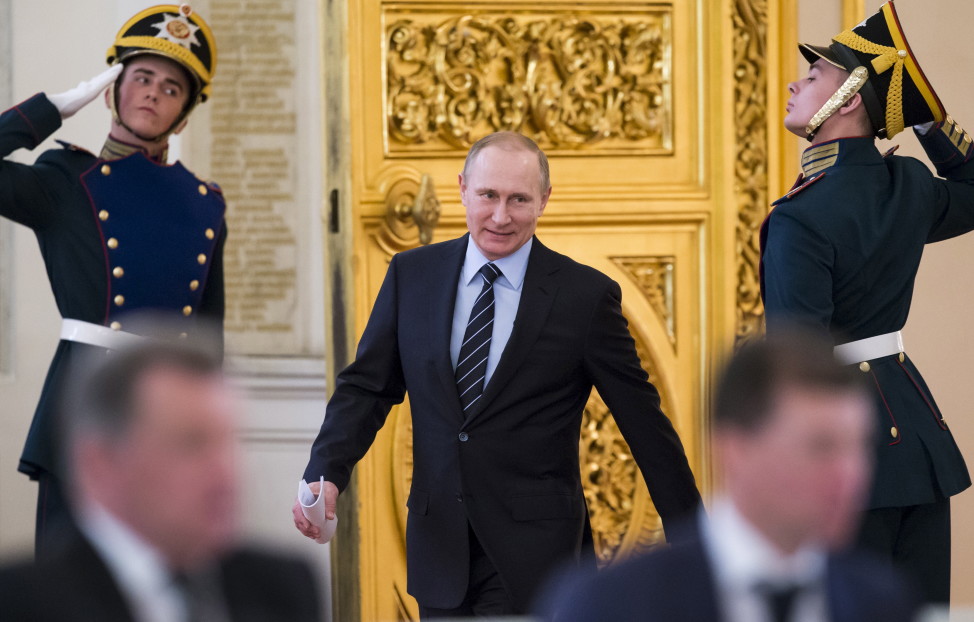By Barbara Slavin
The massive leak of documents from a Panamanian law firm that specialized in setting up offshore tax shelters has rattled world political leaders and claimed at least one victim.

Iceland’s Prime Minister Sigmundur David Gunnlaugsson speaks during a parliamentary session in Reykjavik, April 4, 2016.
Iceland’s Prime Minister Sigmundur David Gunnlaugsson was forced to step aside following a public uproar over an offshore company he created just before his country’s financial meltdown in 2008.
The so-called Panama Papers could also threaten the presidency of Ukraine’s Petro Poroshenko, who has enjoyed substantial backing from the Obama administration against Russian military intervention. He was in Washington just last week to attend Obama’s final nuclear security summit.
Poroshenko, who is believed to be worth about $720-million, was already under fire for failing to curtail his country’s chronic corruption and for reneging on campaign promises to give up extensive personal holdings, including a chocolate factory and a television channel.

Ukraine’s President Petro Poroshenko speaks during a news conference at the Japan National Press Club in Tokyo, April 6, 2016.
According to the documents leaked from the law firm Mossack Fonseca, Poroshenko set up a secret company, Prime Asset Partners, in the British Virgin Islands to manage these assets at the same time that Ukrainian forces were fighting a losing battle against Russia-backed insurgents in Eastern Ukraine in 2014. Poroshenko says he has done nothing wrong and welcomes an investigation.
While not always illegal, such accounts can be used to mask the origin of funds and help owners avoid taxes and uncomfortable questions about how they amassed their fortunes. Gabriel Zucman, author of The Hidden Wealth of Nations, told NPR that 8 percent of the world’s wealth – about $7.6 trillion – is held in tax havens. Among them are Panama, Caribbean islands and the U.S. states of Nevada and Delaware, which have lax rules about company formation.
The Panama Papers began with a leak to German paper, the Süddeutsche Zeitung, which then enlisted the help of the International Consortium of Investigative Journalists in Washington. So far, the documents mention more than 200,000 offshore shell companies and more than 14,000 clients of Mossack Fonseca.
The revelations have touched politicians and celebrities around the world from the brother-in-law of Chinese President Xi Jinping – ironically leading a campaign against corruption by others in China – to the children of Pakistani President Nawaz Sharif and British Prime Minister David Cameron’s late father. So far, no U.S. politicians have been identified although the Justice Department has said it will look into the matter.
According to the reporting done so far, the biggest beneficiary of the Panamanian firm’s services appears to be Russian President Vladimir Putin. At least $2 billion was stashed in foreign banks and offshore accounts nominally owned by Putin cronies, including a childhood friend and cellist, Sergei Roldugin.
Putin, who has controlled Russia since his first term as president began in 2000, is believed to be worth as much as $200 billion, much of it squirreled away abroad under the names of relatives, business associates and friends. The wife of Putin’s spokesman Dmitry Peskov, for example, a former Olympic skater named Tatiana Navka, is the registered owner of an offshore firm created by Mossack Fonseca.

Russian President Vladimir Putin enters a hall before a meeting on the preparations for the upcoming Victory Day, marking the anniversary of the victory over Nazi Germany in World War Two, at the Kremlin in Moscow, Russia, April 5, 2016. (Reuters)
Facing a crumbling domestic economy tied to the price of oil, one might think that the latest scandal would provoke mass protests in Moscow and other major Russian cities. But Peskov dismissed the allegations as “Putinphobia” and the reaction of his countrymen so far appears to be a collective shrug.
“Russians will look at this and say, ‘We already knew this,’ ” Nicholas Gvosdev, a Russia expert and professor of national security studies at the Naval War College, told this analyst. On the other hand, Gvosdev said, “the Ukrainian president might get impeached.”
Peskov suggested that the new charges against the Russian strongman were part of a campaign to distract attention from Russia’s recent military successes in Syria.
Indeed, Putin has been enjoying a surge of domestic popularity because of his military interventions in both Ukraine and Syria.
His announcement last month that he was withdrawing most Russian forces from Syria after six months of heavy bombing surprised other major powers but now appears to have been mostly a public relations stunt.
Michael Kofman, a fellow at the Kennan Institute at the Woodrow Wilson International Center for Scholars, told this analyst that the announcement was a “political reframing” and that the actual withdrawal of air force crews and special forces had been minimal. Indeed, Russian air power just helped Syrian soldiers and allied militias retake the city of Palmyra, site of ancient Roman relics, from the group that calls itself the Islamic State (IS.)
This use of Russian power against IS was the exception in a campaign that has focused on other groups opposed to the government of Syrian President Bashar al-Assad. According to a new report by the Atlantic Council Russia attacked civilian facilities including hospitals and water treatment plants in support of it main goal – strengthening the Assad regime against Western and Arab-backed fighters.
Kofman said Putin seeks maximum leverage in a potential political settlement, wants to test and demonstrate the prowess of Russian forces and military equipment and to show that Russia is a reliable ally for embattled authoritarian regimes compared to the mercurial United States.
Middle Eastern leaders figure prominently in the Panama Papers.
Two cousins of Assad, Rami and Hafez Makhlouf, had numerous dodgy investments set up by Mossack Fonseca. Even though the Makhloufs were under US sanctions, the Panamanian company waited until September 2011 to cut ties with the brothers after the European Union imposed sanctions on them for their role in the brutal crackdown on the Syrian opposition.
U.S. allies in the Middle East also availed themselves of Mossack Fonseca’s services. Among them: King Salman of Saudi Arabia, former prime ministers from Iraq, Qatar and Jordan, the former emir of Qatar and the emir of Abu Dhabi, part of the United Arab Emirates.
Allegations of corruption are likely to have a bigger impact in democracies than in authoritarian states.
The reaction so far in countries such as Russia call to mind the scene in the movie, Casablanca, when the police inspector declares that he is shocked to find gambling going on — just before he is handed his winnings from the roulette table.

